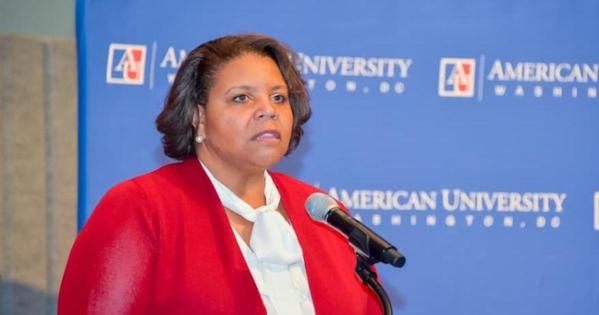Third Year of Inclusive Technology Policy Award: A Conversation with AU Vice Provost for Research and Innovation Diana Burley

On October 30, American University celebrated Zach Tudor as this year’s recipient of AU’s Outstanding Inclusive Technology Policy Changemaker Award. Mr. Tudor is the associate director of the Idaho National Laboratory (INL) where he leads its Nuclear Nonproliferation, Critical Infrastructure Protection, Defense Systems and Homeland Security missions.
The award, which was launched in 2021, honors individuals who have demonstrated a commitment to advancing inclusive global technology policy throughout their careers. Previous recipients are Pamela Wright, the first Chief Innovation Officer of the National Archives and Records Administration, and Doreen Bogdan-Martin (AU/SIS’90), Secretary General of the International Telecommunication Union.
We talked to Diana Burley, AU Vice Provost for Research and Innovation, about the award and its impact.
Beyond this award, how is American University advancing inclusivity in technology policy?
Social justice and social equity are woven into the fabric of everything that we do at American University. Our Inclusive Tech Policy Initiative brings together all of AU’s core values and strengths, while the Changemaker Award has become a catalyst for innovation and engagement. It offers our faculty members, students, and staff the opportunity to learn from the leaders in the field and to celebrate inclusivity.
The Changemaker Award and our Inclusive Tech Policy Initiative have become the underpinnings of the Shahal M. Khan Cyber and Economic Security Institute, which was launched earlier this year. The Khan Institute enfolds a wide range of training courses, guest lectures and workshops in cyber incident response, network security, and the protection of vital infrastructure. The work of the institute is just starting, and we are excited about what’s to come. Earlier this month, we held a special event for AU faculty, students, and alumni who are interested or already engaged in the cyber and economic space to discuss their current work and hopes for the upcoming programming. Mr. Bash Kazi, CEO of Cyber Range Solutions (CRS), who graciously provided the technology to the Khan Institute met with the attendees to talk about his career path and share his insights into what he thinks will be most beneficial to students and faculty, and learn more about the great work and research that AU faculty and students are already conducting.
What does this award mean to you personally and what are your hopes for ITP?
My career has always been about pushing boundaries, serving people, and advancing inclusivity. So, when we launched the Award, I hoped to make it about all these qualities, and that it would allow us to recognize the spirit of innovation and to recognize superstars who rarely appear in news headlines, but who are doing incredibly critical work. I’m glad that is what this award has become in such a short time.
I joined AU three and a half years ago, and this Award is very special to me. It has become a reflection of my time here and it is my hope that one day AU will be known for its work in inclusive tech policy.
How are AU students participating in advancing tech policy and the work of ITP?
Our students will always be the primary focus of everything that we do. The Inclusive Tech Policy initiative has already offered dozens of our finest young scholars the opportunity to meet and learn from our renowned awardees, to conduct research alongside AU faculty members, and to work with sponsors and communities here in Washington and across our nation.
A few months ago, Kashvi Chandok (SIS’24), one of the students who has been working with ITP, was selected to attend the United Nations Commission on the Status of Women, where she participated in a panel addressing the impact of surveillance technologies on women journalists and human rights defenders.
From participating in international conferences on surveillance technologies and human rights defenders, to working alongside faculty in the inclusive tech space, to attending presentations and speaker engagements from executives and professionals in the field – students who are passionate about inclusive technology policy are forging meaningful connections and successfully networking to positively impact the inclusive technology space. Some of the highlights of our students’ work include a collaboration with the DNS Research Foundation, meetings with renowned thought leaders in the cybersecurity industry, and participation at highly coveted conferences, such as Women In Cybersecurity (WiCyS) and the United Nations Convention.
